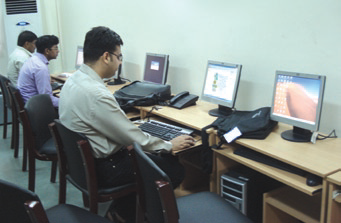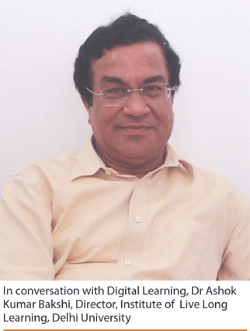

From a modest beginning with three colleges, two faculties and 750 students, Delhi University has now acquired the stature of being the largest central University in India with 79 colleges, 14 faculties and an expansive student body of 3,70,000 students. To maintain its high standards in teaching and research, the University is constantly involved in undertaking several new initiatives to enhance the quality of content and its delivery.
However, this endeavour is strewn with several challenges such as designing of courses, development of learning material, learner centric delivery of the material, setting up advanced laboratories for science courses, and continuous evaluation, upgradation and modernisation of syllabi. With an aim to tackle some of these challenges and encourage a dynamic and collaborative learning environment, the Institute of Lifelong Learning (ILLL) was setup in 2007.
The major goals of ILLL are development of e-Learning material (print, multi-media and web based), faculty development, creating innovative delivery methods like Self Instructional Mode (SIM) and Distance Learning in order to encourage self reliance among students, and most importantly, encourage research which seems to be flagging in our country. The institute also plans to conduct research in curricula development.
The University also has a Centre for Professional Development in Higher Education (CPDHE), which undertakes orientation programmes and refresher courses for fresh university teachers. The CPDHE is being merged with ILLL.
Dr Ashok K Bakhshi is the Director of the ILLL as well as CPDHE. A professor of Physical Chemistry in the University, he holds the Sir Shankar Lal Chair of Chemistry since 1996. A double gold medalist, he has authored, individually and in partnerships, more than 100 research and education articles, three books and one patent.
Dr Bakhshi is the recipient of several awards and academic honours. He is also on the editorial boards of reputed scientific journals and has been associated with various academic bodies like CBSE, NCERT, CSIR, UGC, etc.
How did the concept of ILLL evolve and what are the main objectives?
The concept of Lifelong Learning is very vast. It is three-dimensional – life long, wide and deep in nature – and cannot be quantified or captured. The term implies that it is never too soon or too late to learn; one should always be open to new ideas and learning. It is a form of pedagogy and involves digital learning, e-Learning, distance learning, etc. The concept was created in 2007 with the following objectives in mind Development of e-Learning material Backup material for classroom teaching Development and designing of courses for professional development of faculty Continuous evaluation, upgradation and modernisation of syllabi and setting up of advanced laboratories for different courses
How is the institute achieving the objective of development of e-Learning material ?
The development of e-Learning material will be done in two stages – one by producing reading material in print orm; and second, creating e-Learning material to be uploaded on the ILLL portal. Apart from the text, web links,video snippets, virtual labs, etc. will also be included. Education comes in two forms – one is formal learning through the traditional classroom model and the second is open learning. We are trying to develop material for both the models. In DU, Open Learning is currently limited to humanities and arts subjects and we are involved in the task of preparing instruction material in a student-friendly simplistic langua e. We believe e-Learning is going to alter the face of higher education in the coming years. Preparing for elearning is, therefore , preparing for future.
What are the other initiatives that have been introduced?
There is also a plan to train teachers in ICT at the undergraduate level
• • for which we are developing course material for B.Ed and B.El.Ed courses in
collaboration with the Central Institute of Education. Knowledge of ICT technologies is crucial in providing the uch needed impetus for e-learning in
the country.
What are the steps taken in order to enhance the quality of teachers?
Our faculty development programme focuses on the need to constantly update the teachers. There are many UGC sponsored refresher and orientation courses or the purpose. ILLL is also working on starting faculty development programmes on specialised topics n various disciplines. A teacher undergoing the development programme can choose the topic of his/her discipline. The course content includes current features as well as new developments in the subjects. Our initial plan is to cover every teacher once in four years. Later on, the frequency of the training will be increased.
How does this content enhancelearning for students?
Syllabi throughout the colleges are uniform, but our content comprising the reading and e-learning material proves to be a value addition for the students. For example, if a teacher is taking a class on Thermo-dynamics, the students
can access our portal and gather mo e information on the topic. So here, we
are supplementing the traditional form of learning, a process that is known as Blended Learning.
Does this material go beyond the university level?What other courses have been introduced?
Right now we are focussed on producing e-learning material for the university courses. We are also introducing some new courses like Foundations of Banking in collaboration with ICICI Bank, the course content for which will be designed by them. We also have other courses like English Language Proficiency, which is a short term course designed to help those who are weak in English. Other courses that have been proposed are in Academic Administration, Information Literacy and Research Methodologies. As we emphasise on the teaching and
learning element, the development of e-learning material is our central focus. Since a teacher is always limited by time constraints, e-learning content can supplement the traditional mode of teaching, with additional features.
How does ILLL develop the content?
What kind of technology is required for the purpose? Our e-learning content is being developed in two stages. We are developing various programmes and reading material from our syllabi prepared by experts for the students. This creates uniformity and is like a benchmark for the university students as well as faculty members. The second step would be to enhance this reading material through ICT. We add audio-visual and other such productive features, lending the course vitality and value addition. In order to disseminate such rich content we need a higher bandwidth. A similar project called Sakshat has been undertaken by the Ministry of Human Resource Management, Government of India, with which I am associated as the Chairman of the Content Advisory Committee for Chemistry. Sakshat for the +2 level takes NCERT text books as the base for further supplementing the course. We are also working on developing laboratory manuals for experiments in science courses. This manual will be supplemented by live recording of experiments which will be uploaded on the ILLL portal.
When will this project beaccomplished?
It is going to be a gradual process. But we hope to introduce the content for this year’s batch of fi rst year students. Is this content accessible to the public? What are the challenges? Our portal has been inaugurated but it is not in the public domain yet. Once the material has been uploaded, we will provide connectivity to all the colleges so that students can make ample use of this facility. There are technical challenges involved in providing this kind of connectivity, but we will have to tackle them. One reason why research suffers in our country is because of lack of clarity of content, and that is what ILLL strives to achieve and enhance. The course material in classes 11 and 12 are extremely heavy for a fresh entrant in the fi eld, resulting in very few students
opting for pure science subjects later. This affects future research and this is one reason our country is lagging in research. The exam oriented approach needs to be modifi ed by making the syllabi light to give students more time
to grasp it thoroughly.
What are the challenges faced byteachers?
Faculty development is a crucial element in ILLL. The competency of the teacher needs to be regularly upgraded throughout his or her professional
career. The present day economy is a knowledge economy and things are changing constantly. Therefore, teaching needs to be dynamic and teachers should update themselves with the latest developments. The main aim is to introduce dynamism and an urge to learn, not invoke unhealthy competition or pressure. How does one encourage teachers? From my experience as a teacher, I can say one way to foster encouragement among teachers is for the Government to recognize the importance of teaching. In my opinion there is a lot of emphasis on research and there are several awards for excellence in research. However, there are no government recognised awards for excellence in teaching. As a matter of fact, there is hardly any mechanism to evaluate the quality of teaching being imparted to students. One cannot be oblivious of the fact that once the quality of teaching improves, the quality of research will automatically improve. Giving recognition to teaching could be a very crucial motivational factor for teachers to engage in research and innovation in teaching.
What new innovations have been introduced at ILLL?
We are going to introduce a scheme where lectures of a competent teacher can be taken across colleges. Once a competent teacher is identifi ed, his or her lectures can be recorded and uploaded for students across the University, which is the main aim of e-learning. There should also be a proper coordination between school education and higher education. The college should pick up from where the school has left, rather than being repetitive.
What do you think is the main problem with our Indian education system?
The main problem that faces our students, especially when they enter the fi eld of higher education, is the lack of ability to implement what they have learnt in school. In school they might have acquired 95%, but when they go to IIT or abroad, they fare poorly because they are not taught to think out of the box or beyond the syllabi.





















